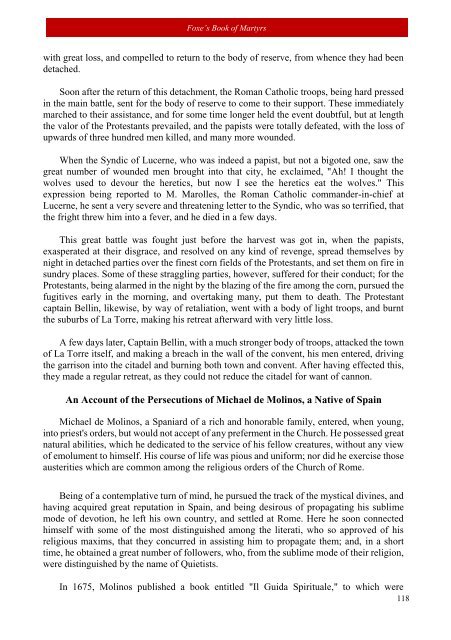Foxe - The Book of Martyrs
The mystery of history is not completely dark, since it is a veil which only partially conceals the creative activity and spiritual forces and the operation of spiritual laws. It is commonplace to say that the blood of the martyrs is the seed of the Church yet what we are asserting is simply that individual acts of spiritual decision bear social fruit …For the great cultural changes and historic revolutions that decide the fate of nations or the character of an age is the cumulative result of a number of spiritual decisions … the faith and insight, or the refusal and blindness, of individuals. No one can put his finger on the ultimate spiritual act that tilts the balance, and makes the external order of society assume a new form… Persecution, powerless to destroy or even to shake this new community, made it only the more sensible of its own strength, and pressed it into a more compact body.
The mystery of history is not completely dark, since it is a veil which only partially conceals the creative activity and spiritual forces and the operation of spiritual laws. It is commonplace to say that the blood of the martyrs is the seed of the Church yet what we are asserting is simply that individual acts of spiritual decision bear social fruit …For the great cultural changes and historic revolutions that decide the fate of nations or the character of an age is the cumulative result of a number of spiritual decisions … the faith and insight, or the refusal and blindness, of individuals. No one can put his finger on the ultimate spiritual act that tilts the balance, and makes the external order of society assume a new form… Persecution, powerless to destroy or even to shake this new community, made it only the more sensible of its own strength, and pressed it into a more compact body.
Create successful ePaper yourself
Turn your PDF publications into a flip-book with our unique Google optimized e-Paper software.
<strong>Foxe</strong>’s <strong>Book</strong> <strong>of</strong> <strong>Martyrs</strong><br />
with great loss, and compelled to return to the body <strong>of</strong> reserve, from whence they had been<br />
detached.<br />
Soon after the return <strong>of</strong> this detachment, the Roman Catholic troops, being hard pressed<br />
in the main battle, sent for the body <strong>of</strong> reserve to come to their support. <strong>The</strong>se immediately<br />
marched to their assistance, and for some time longer held the event doubtful, but at length<br />
the valor <strong>of</strong> the Protestants prevailed, and the papists were totally defeated, with the loss <strong>of</strong><br />
upwards <strong>of</strong> three hundred men killed, and many more wounded.<br />
When the Syndic <strong>of</strong> Lucerne, who was indeed a papist, but not a bigoted one, saw the<br />
great number <strong>of</strong> wounded men brought into that city, he exclaimed, "Ah! I thought the<br />
wolves used to devour the heretics, but now I see the heretics eat the wolves." This<br />
expression being reported to M. Marolles, the Roman Catholic commander-in-chief at<br />
Lucerne, he sent a very severe and threatening letter to the Syndic, who was so terrified, that<br />
the fright threw him into a fever, and he died in a few days.<br />
This great battle was fought just before the harvest was got in, when the papists,<br />
exasperated at their disgrace, and resolved on any kind <strong>of</strong> revenge, spread themselves by<br />
night in detached parties over the finest corn fields <strong>of</strong> the Protestants, and set them on fire in<br />
sundry places. Some <strong>of</strong> these straggling parties, however, suffered for their conduct; for the<br />
Protestants, being alarmed in the night by the blazing <strong>of</strong> the fire among the corn, pursued the<br />
fugitives early in the morning, and overtaking many, put them to death. <strong>The</strong> Protestant<br />
captain Bellin, likewise, by way <strong>of</strong> retaliation, went with a body <strong>of</strong> light troops, and burnt<br />
the suburbs <strong>of</strong> La Torre, making his retreat afterward with very little loss.<br />
A few days later, Captain Bellin, with a much stronger body <strong>of</strong> troops, attacked the town<br />
<strong>of</strong> La Torre itself, and making a breach in the wall <strong>of</strong> the convent, his men entered, driving<br />
the garrison into the citadel and burning both town and convent. After having effected this,<br />
they made a regular retreat, as they could not reduce the citadel for want <strong>of</strong> cannon.<br />
An Account <strong>of</strong> the Persecutions <strong>of</strong> Michael de Molinos, a Native <strong>of</strong> Spain<br />
Michael de Molinos, a Spaniard <strong>of</strong> a rich and honorable family, entered, when young,<br />
into priest's orders, but would not accept <strong>of</strong> any preferment in the Church. He possessed great<br />
natural abilities, which he dedicated to the service <strong>of</strong> his fellow creatures, without any view<br />
<strong>of</strong> emolument to himself. His course <strong>of</strong> life was pious and uniform; nor did he exercise those<br />
austerities which are common among the religious orders <strong>of</strong> the Church <strong>of</strong> Rome.<br />
Being <strong>of</strong> a contemplative turn <strong>of</strong> mind, he pursued the track <strong>of</strong> the mystical divines, and<br />
having acquired great reputation in Spain, and being desirous <strong>of</strong> propagating his sublime<br />
mode <strong>of</strong> devotion, he left his own country, and settled at Rome. Here he soon connected<br />
himself with some <strong>of</strong> the most distinguished among the literati, who so approved <strong>of</strong> his<br />
religious maxims, that they concurred in assisting him to propagate them; and, in a short<br />
time, he obtained a great number <strong>of</strong> followers, who, from the sublime mode <strong>of</strong> their religion,<br />
were distinguished by the name <strong>of</strong> Quietists.<br />
In 1675, Molinos published a book entitled "Il Guida Spirituale," to which were<br />
118


















